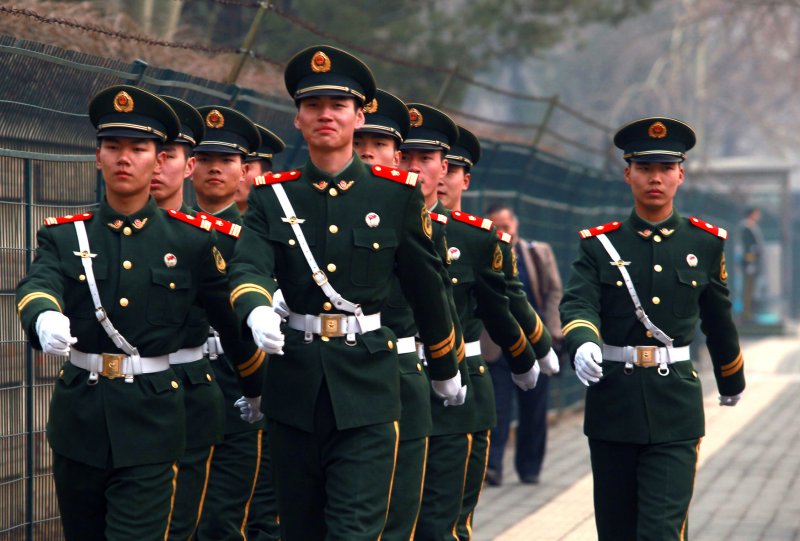Chinese People's Liberation Army soldiers march through the North Korean Embassy area in Beijing in 2013. Earlier this month, China allowed 13 North Koreans traveling on "valid passports" to leave the country, which signals a change, according to a U.S. human rights activist. File Photo by Stephen Shaver/UPI |
License Photo
SEOUL, April 25 (UPI) -- China's justification for the departure of 13 North Koreans from a state-run restaurant could mean its policy toward Pyongyang is changing, a veteran human rights activist said.
Suzanne Scholte, the U.S. chairwoman of the North Korean Freedom Coalition, told Yonhap the group defection provides circumstantial evidence of a shift in Beijing's approach to relations.
Earlier in April, China broke its silence on the defection of 13 North Koreans from Ningbo.
According to Beijing, all 13 North Korean nationals left China early April 6 while traveling on "valid passports," providing a reason for not apprehending them at the border.
China has typically repatriated North Koreans in the country, despite being a signatory to the U.N. Convention Against Torture.
Scholte also told South Korea press sanctions that go toward blocking revenues from the North's forced laborers abroad are effective and could hasten a North Korea collapse.
Sanctions play a role in choking off the flow of luxury goods and gifts that Kim Jong Un confers upon loyal elites, she said.
The activist said the concern now is for the families of the 13 defectors – a man and 12 women – who could be taken to political prison camps because of their escaped relatives.
North Korea had called for a reunion of the defectors with their families last week, a proposal Seoul turned down, citing policy.
But Scholte said the family visits should be permitted on the grounds the meeting could allow the North Koreans to experience a "free society."
Pyongyang is sensitive to the issue of defectors, and last August demanded an end to the loudspeaker broadcasts across the demilitarized zone only when the South began broadcasting defector testimonials, Scholte said.
U.S. President Barack Obama, during his visit to Germany on Sunday, urged Beijing to increase pressure on North Korea, but he did not address China's role in the recent defections.
That statement drew a reaction from China Monday, Yonhap reported.
Foreign Ministry spokeswoman Hua Chunying said, "China has done what it can do...If the U.S. thinks that China has not done enough, has the U.S. done its part?"















